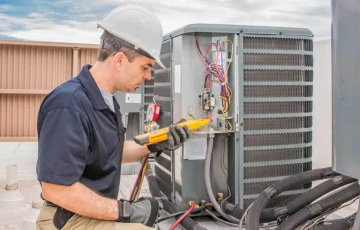
HVAC Technician – Pros and Cons of Working
The Pros and Cons of Working as an HVAC Technician in the Current Job Market Search HVACR Certified Technician ProgramsGet
 HVAC Technician Salaries: An Overview
HVAC Technician Salaries: An OverviewHVAC technicians are skilled professionals who play a critical role in ensuring that buildings and homes are comfortable and safe to live and work in. The need for HVAC technicians is rising with the increasing demand for energy-efficient and sustainable HVAC systems. In this article, we will explore the HVAC technician’s salaries, including the average salaries of HVAC technicians, the salary ranges for HVAC technicians, and the factors that affect their wages.
According to the Bureau of Labor Statistics (BLS), the median annual wage for HVAC technicians was $51,550 as of May 2020. Half of all HVAC technicians earned more than this, and half earned less. HVAC technicians in the top 10% of their field can earn upwards of $79,000 per year, while those in the bottom 10% can earn less than $32,000 per year.
HVAC technicians are critical in ensuring the comfort and safety of buildings and homes. Their salaries can vary significantly based on several factors, including location, education and certification, experience, company size, and industry. Considering a career as an HVAC technician, it is important to keep these factors in mind as you plan your future.
HVAC technicians ensure that buildings and homes are comfortable and safe to live and work in. The need for HVAC technicians is rising with the increasing demand for energy-efficient and sustainable HVAC systems. In this article, we will explore the HVAC technician salaries by state, including the highest-paying states for HVAC technicians, the lowest-paying states for HVAC technicians, and the regional differences in HVAC technician salaries.
According to the Bureau of Labor Statistics (BLS), the states with the highest average salaries for HVAC technicians as of May 2020 are:
It is important to note that the cost of living in these states is also typically higher than in other states.
The states with the lowest average salaries for HVAC technicians as of May 2020 are:
Again, it is important to note that the cost of living in these states is typically lower than in other states.
In addition to differences between states, there can also be significant regional differences in HVAC technician salaries within a state. For example, HVAC technicians in large metropolitan areas typically earn higher salaries than those working in rural areas. This is due to the higher cost of living in cities and the greater demand for HVAC technicians in these areas.
HVAC technician salaries can vary significantly based on several factors, including location, education and certification, experience, company size, and industry. Suppose you are considering a career as an HVAC technician. In that case, it is important to research the salaries in your area and consider the cost of living and the other factors that affect HVAC technician salaries.
HVAC technicians ensure that buildings and homes are comfortable and safe to live and work in. The need for HVAC technicians is rising with the increasing demand for energy-efficient and sustainable HVAC systems. In this article, we will explore the HVAC technician’s salaries by industry, including the salaries of residential HVAC technicians, commercial HVAC technicians, industrial HVAC technicians, and government HVAC technicians.
Residential HVAC technicians are responsible for installing, maintaining, and repairing home HVAC systems. According to the Bureau of Labor Statistics (BLS), the median annual wage for residential HVAC technicians was $51,550 as of May 2020. This is in line with the average salary for all HVAC technicians.
Commercial HVAC technicians are responsible for installing, maintaining, and repairing HVAC systems in commercial buildings, such as office buildings and retail spaces. According to the BLS, the median annual wage for commercial HVAC technicians was $51, 550 as of May 2020. This is in line with the average salary for all HVAC technicians.
Industrial HVAC technicians are responsible for installing, maintaining, and repairing HVAC systems in industrial facilities, such as factories and warehouses. According to the BLS, the median annual wage for industrial HVAC technicians was $51, 550 as of May 2020. This is in line with the average salary for all HVAC technicians.
Government HVAC technicians are responsible for installing, maintaining, and repairing HVAC systems in buildings such as schools and government offices. According to the BLS, the median annual wage for government HVAC technicians was $51, 550 as of May 2020. This is in line with the average salary for all HVAC technicians.
HVAC technicians’ salaries can vary based on the specific industry, with the average salary for all HVAC technicians being $51,550 as of May 2020. Regardless of the industry, HVAC technicians ensure that buildings and homes are comfortable and safe to live and work in.
As an HVAC technician, you play a critical role in ensuring that buildings and homes are comfortable and safe to live and work in. The need for HVAC technicians is rising with the increasing demand for energy-efficient and sustainable HVAC systems. This article will explore ways to increase your HVAC technician salary, including continuing education and certification, gaining experience, networking and building relationships, and specializing in a particular HVAC area.
One of the best ways to increase your HVAC technician salary is to invest in continuing education and certification. By obtaining certificates from organizations such as the Environmental Protection Agency (EPA) and the National Institute for Automotive Service Excellence (ASE), you can demonstrate a high level of expertise and knowledge in the HVAC field. This can lead to higher salaries, job opportunities, and job security.
Experience is a valuable commodity in the HVAC industry, and HVAC technicians who have worked in the field for several years typically earn higher salaries than those just starting. To gain experience, you can start by taking on additional responsibilities at your current job, or you can seek out new job opportunities that will allow you to expand your skills and gain more experience.
Networking and building relationships with other HVAC technicians and building owners, contractors, and other HVAC industry professionals can help you increase your HVAC technician’s salary. By establishing a solid network, you can learn about new job opportunities, gain access to new clients, and get valuable insights into the HVAC industry.
Another way to increase your HVAC technician’s salary is to specialize in a specific HVAC area. For example, you can specialize in installing and repairing energy-efficient HVAC systems, or you can specialize in working with commercial HVAC systems. By specializing, you can become an expert in your field, leading to higher salaries and greater job security.
There are many ways to increase your HVAC technician’s salary. By investing in continuing education and certification, gaining experience, networking and building relationships, and specializing in a particular area of HVAC, you can take your career to the next level and maximize your earning potential.
HVAC technicians ensure that buildings and homes are comfortable and safe to live and work in. In this article, we have explored the topic of HVAC technician salaries, including the average salaries of HVAC technicians, the salary ranges for HVAC technicians, the factors that affect their salaries, and ways to increase your HVAC technician salary.
Recap of Key Points
The future outlook for HVAC technicians is positive, with the employment of HVAC technicians projected to grow 15% from 2019 to 2029, much faster than the average for all occupations, according to the BLS. With the increasing demand for energy-efficient and sustainable HVAC systems, the need for HVAC technicians is expected to grow in the coming years.
Suppose you are considering a career as an HVAC technician. In that case, it is essential to research the salaries in your area and consider the cost of living and the other factors that affect HVAC technician salaries. It is also vital to stay up to date with industry trends and advancements in HVAC technology, as this knowledge can help you provide better services to your clients and increase your earning potential. Investing in continuing education and certification, gaining experience, networking and building relationships, and specializing in a specific HVAC area can help you increase your HVAC technician salary and advance your career.
HVAC technicians are critical in ensuring the comfort and safety of buildings and homes. The demand for HVAC technicians will continue to grow in the coming years. By staying informed and taking advantage of growth opportunities, you can maximize your earning potential as an HVAC technician and secure a bright future in this rewarding field.
| Rank | State | Avg. Salary | Hourly Rate | Job Count |
|---|---|---|---|---|
| 50 | Alabama | $40,443 | $19.44 | 425 |
| 1 | Alaska | $76,272 | $36.67 | 117 |
| 30 | Arizona | $49,664 | $23.88 | 750 |
| 49 | Arkansas | $38,319 | $18.42 | 270 |
| 20 | California | $67,931 | $32.66 | 2,317 |
| 28 | Colorado | $51,242 | $24.64 | 774 |
| 2 | Connecticut | $77,369 | $37.20 | 381 |
| 3 | Delaware | $65,916 | $31.69 | 167 |
| 14 | District of Columbia | $77,184 | $37.11 | 73 |
| 40 | Florida | $45,187 | $21.72 | 2,103 |
| 29 | Georgia | $49,496 | $23.80 | 1,357 |
| 46 | Hawaii | $49,136 | $23.62 | 79 |
| 32 | Idaho | $54,131 | $26.02 | 126 |
| 15 | Illinois | $59,909 | $28.80 | 1,354 |
| 19 | Indiana | $53,424 | $25.68 | 805 |
| 24 | Iowa | $48,624 | $23.38 | 746 |
| 41 | Kansas | $47,087 | $22.64 | 300 |
| 45 | Kentucky | $45,141 | $21.70 | 387 |
| 22 | Louisiana | $51,588 | $24.80 | 381 |
| 10 | Maine | $55,625 | $26.74 | 252 |
| 8 | Maryland | $74,064 | $35.61 | 621 |
| 5 | Massachusetts | $74,848 | $35.98 | 913 |
| 27 | Michigan | $53,148 | $25.55 | 818 |
| 17 | Minnesota | $60,386 | $29.03 | 705 |
| 36 | Mississippi | $46,531 | $22.37 | 267 |
| 47 | Missouri | $43,439 | $20.88 | 639 |
| 25 | Montana | $51,550 | $24.78 | 132 |
| 33 | Nebraska | $46,528 | $22.37 | 320 |
| 7 | Nevada | $59,097 | $28.41 | 269 |
| 12 | New Hampshire | $57,859 | $27.82 | 219 |
| 4 | New Jersey | $74,883 | $36.00 | 892 |
| 51 | New Mexico | $41,459 | $19.93 | 155 |
| 11 | New York | $64,270 | $30.90 | 1,462 |
| 26 | North Carolina | $49,060 | $23.59 | 1,332 |
| 23 | North Dakota | $55,554 | $26.71 | 88 |
| 21 | Ohio | $55,949 | $26.90 | 992 |
| 44 | Oklahoma | $45,774 | $22.01 | 329 |
| 9 | Oregon | $65,739 | $31.61 | 442 |
| 18 | Pennsylvania | $61,631 | $29.63 | 1,046 |
| 16 | Rhode Island | $65,601 | $31.54 | 101 |
| 31 | South Carolina | $47,360 | $22.77 | 652 |
| 42 | South Dakota | $43,943 | $21.13 | 125 |
| 43 | Tennessee | $42,189 | $20.28 | 755 |
| 38 | Texas | $49,657 | $23.87 | 2,070 |
| 37 | Utah | $48,467 | $23.30 | 361 |
| 34 | Vermont | $48,643 | $23.39 | 94 |
| 13 | Virginia | $64,827 | $31.17 | 1,018 |
| 6 | Washington | $76,503 | $36.78 | 588 |
| 48 | West Virginia | $40,938 | $19.68 | 153 |
| 35 | Wisconsin | $50,296 | $24.18 | 542 |
| 39 | Wyoming | $50,664 | $24.36 | 45 |

The Pros and Cons of Working as an HVAC Technician in the Current Job Market Search HVACR Certified Technician ProgramsGet

Is HVAC a Good Career? Yes! Search HVACR Certified Technician ProgramsGet information on HVACR Certified Technician programs by entering your

How Much Do HVAC Techs Make? An Overview of Salaries in the Industry Search HVACR Certified Technician ProgramsGet information on

Introduction to HVAC: Understanding the Basics Search HVACR Certified Technician ProgramsGet information on HVACR Certified Technician programs by entering your